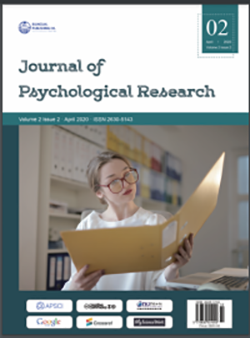-
689
-
586
-
403
-
316
-
295
The Relationship between Flow Experience in Leisure and Life Satisfaction in Undergraduates
DOI:
https://doi.org/10.30564/jpr.v2i2.1901Abstract
Objective: To understand the current situation of undergraduates' flow experience in leisure and life satisfaction, and to explore the relationship between the two. Methods: A stratified random sampling method was used to select 781 undergraduates (377 males and 410 females) from 7 colleges and universities in Guangdong Province. They were investigated using the Flow Experience in Leisure Questionnaire (FELQ) and the Youth Life Satisfaction Scale (YLSS). Results: The total scores of FELQ and YLSS of the students in this group are (161.73 ± 19.81) and (174.45 ± 26.50). FELQ's unity of knowledge and action, challenge and skill balance, concentration, grade ranking, family economic status are positively related to YLSS 'life satisfaction (β = .227, .115, .098, .158, .082, P < .05); "Like to sleep during leisure" is negatively correlated with life satisfaction of YLSS (β =-. 097, P <.05); FELQ's unity of knowledge and action, concentration, grade ranking and family economic status are positively related to YLSS's self-satisfaction (β = .286, .126, .194, .096, P <.01); "Like to sleep during leisure” is negatively correlated with YLSS ’s self-satisfaction (β =-. 091, P <.01); FELQ ’s unity of knowledge and action, challenge and skill balance, father’s occupation, “like self-study in leisure” are positively related to YLSS ’environmental satisfaction (β = .198, .131, .075, .073, P <.05); "Like to sleep during leisure", gender and YLSS environment satisfaction negatively correlated (β =-. 094, -.091, P <.01). Conclusion: Flow experience in leisure, types of leisure activities, gender, grade ranking and family factors (family economic status and father's occupation) may be related factors for the development of college students' life satisfaction.
Keywords:
Undergraduates; Flow experience in leisure; Life satisfaction; Related FactorsReferences
[1] Ma Huidi. Theoretical exploration of leisure issues [J]. Journal of Tsinghua University (Philosophy and Social Sciences Edition). 2001, 16 (6): 71-75.
[2] Huang Saichan. Research on the relationship between leisure satisfaction and subjective well-being of undergraduates [D]. Changsha: Hunan Normal University. 2010,05.
[3] Tan Lei, Liu Yu. Research on the influence of undergraduate leisure activity participation on happiness [J]. Journal of Changchun University of Technology (Higher Education Research Edition). 2014, 35 (4): 86-90.
[4] Hu Bingzheng. Research on the relationship between undergraduate leisure activities and stress, depression, well-being [J]. Chinese General Practice. 2015, 18 (19): 2341-2345.
[5] Csikszentmihalyi M. Finding flow: The psychology of engagement with everyday life [M]. New York: Harper Collins, 1997, 71.
[6] Guo Zhaoyuan. The relationship between leisure flow experience, leisure experience and physical and mental health [D]. Taipei: National Political University. 2003, 05.
[7] Cai Zhaojian. Research on the relationship between leisure satisfaction, smooth experience and subjective well-being of the elderly [D]. Chongqing: Chongqing Normal University. 2014, 06.
[8] Zheng Yuannan, Yuan Yingxin, Cao Xing. Research on leisure sports participants' fluency, satisfaction and well-being from the perspective of leisure education [J]. Journal of Beijing Sport University. 2016,39 (1): 102-111.
[9] Zhang Xinggui. The relationship between the personality of young students and their subjective well-being [D]. Guangzhou: South China Normal University. 2003, 05.
[10] Tian Xianhua. The relationship between smooth experience in undergraduate leisure activities and physical and mental health [D]. Changchun: Northeast Normal University. 2010,05.
[11] Xiong Ying. Research on the relationship between leisure motivation, boredom and life satisfaction of undergraduate [D]. Shijiazhuang: Hebei University. 2017,05.
[12] Ji Jiajia, Wu Yan, Tian Xuehong. The relationship between undergraduate mobile phone dependence, academic delay and subjective well-being [J]. Journal of Hangzhou Normal University (Natural Science Edition). 2014, 13 (5), 482-487.
[13] Waggstaff, A., and Doorslaer, E. V. Income inequality and health: what does the literature tell us? [J]. Annual reeview of public health, 2000, (21): 543-567.




 Yongmei Hou
Yongmei Hou





